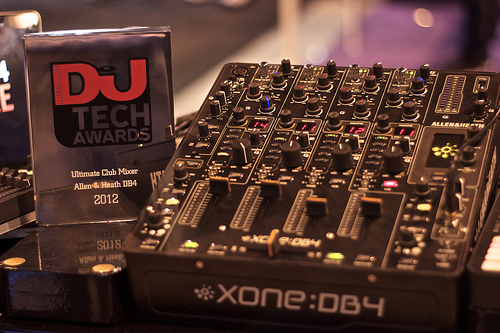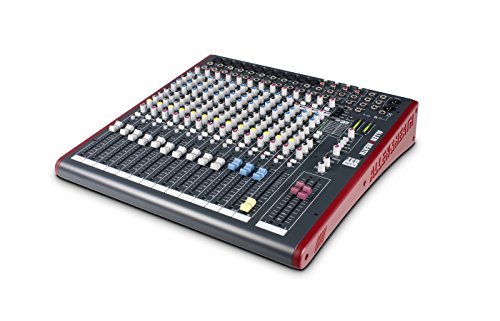The best way to get to know a company is to look at their products. We’ve picked out two mixers from Allen & Heath and pitted them side by side against two mixers from Behringer, thinking about qualities like value and usability as well as straight sound quality. Read the full reviews below to see the results of the Battle of Behringer vs Allen & Heath Mixers.
Behringer vs Allen & Heath Mixers Round 1: Behringer Digital Pro DDM4000
Let’s start off by comparing two DJ mixers to get at the core differences between the two bands. This mixer is the Behringer DDM4000, a 5-channel 32-bit digital mixer with all the bells and whistles a DJ craves, like a beat-controlled loop, live pitch control, and an assignable digital crossfader. All of these functions are intuitively laid out, making this mixer as easy to use as it is comprehensive.
In terms of connectivity, the DDM4000 is a beast. With 4 stereo channels to work with, you can mix up to 8 sound sources at once. You’ll also get two mic inputs with the same EQ, gain, and effects controls as the main lines. On the other end, it integrates seamlessly with most DJ software, making it equally functional as a MIDI controller.
This is a rugged little mixer, too. It’s lighter than you might expect, at just over 12 pounds, but it still feels plenty sturdy and the construction quality is on point. This makes it ideal for both traveling DJs and venue owners since it can stand up to a lot of use without losing performance.
To top it all off, the Behringer DDM4000 is incredibly affordable. This is the best value you’ll find for a professional-level DJ mixer. It’s a great choice for anyone who wants to keep an eye on their budget without sacrificing sound.
Behringer vs Allen & Heath Mixers Round 2: Allen & Heath Xone:DB4
In contrast to the Behringer DDM4000, let’s look at Allen & Heath’s most-praised DJ mixer. The Xone DB4 is a fully-featured digital DJ mixer with built-in loop synchronization and a flexible input layout. It’s also compatible with mixing software like Serato—it’s a pricey option as MIDI controllers go, but it’ll do the work beautifully.
And that gets to the first difference you’ll notice with the Allen & Heath Xone (see full specs): the price. It’s many times the cost of the Behringer for a model with basically the same number of channels. But the Xone DB4 feels more substantial. Not because it’s that much heavier—it’s still very portable at under 20 pounds—but holding it, the thing feels indestructible. It’s built to withstand the rigors of nightly use and is ideal for high-volume venues.
The most important difference between the two, though (and the reason for the big difference in price) is the sound. The quad DSP engine used in the Xone is powerful and efficient. The clarity of the mix is stunning. You’ll really notice the difference when you use the on-board effects, which are natural and blend seamlessly with the signal. The Xone DB4 is a bigger investment, but it doesn’t take an audiophile to hear it’s the superior mixer.
Behringer vs Allen & Heath Mixers Round 3: Behringer Europower PMP4000
Both Behringer and Allen & Heath also make studio mixers that are as well-regarded as their options for DJs. The Behringer PMP4000 is a 16-channel 1600-watt powered mixer with a 24-bit stereo effects processor. The Xenyx preamps add a nice transparent warmth, and overall you’ll be impressed by the clarity of sound.
The PMP4000 uses a class-D amplifier that gives it more efficient power handling and heat dispersal. This not only lets you do more with less power, it also reduces the weight. At only 22 pounds, this mixer isn’t a beast to move like some powered decks—a plus if you don’t always record in the same place.
The FX presets are functional and most of them sound pretty good, but the straightforward sound mixing features are more impressive here. It’s a top performer for feedback elimination and the 7-band EQ makes it easy to get the best sound from any ensemble.
Behringer vs Allen & Heath Mixers Round 4: Allen & Heath ZED-16FX
The nearest apples to apples comparison for the Behringer mixer above would be the Allen & Heath ZED-16FX. Like with the DJ mixers, it’s the costlier option (though price fluctuations do happen). For that extra investment, you get a higher sound quality and fuller connectivity options.
The DuoPre pre-amps (see full specs) are what really make the difference in the sound here. They control the gain with a two-stage process, giving it a massive range of 69dB. The EQ also has a swept mid-range that tailors the equalization to the signal. The 16 included effects sound great, too, and are just as easy to control as if you were using them on a pedal.
The transparency and power of this mixer are its key selling points. It’ll give you consistently clean balanced sound every time you use it, on any kind of instrument. This versatility makes it very appealing to recording engineers and live venues as well as performing musicians.
The Bottom Line: Behringer vs. Allen & Heath Mixers
Summed up in a single sentence, the key difference between these brands is that Behringer focuses on bringing customers professional performance at an affordable price, while Allen & Heath is committed to providing the best possible sound quality, period.
Now this isn’t to say Behringer mixers don’t sound good—Allen & Heath mixers just sound better thanks to their more sophisticated pre-amps and higher-powered processors. If you need a good mixer and don’t have a huge budget, Behringer is definitely the way to go. If money is no object and you want CD-quality sound, check out Allen & Health.
Hopefully this has helped you figure out which brand of mixer is the right choice for you. If you’re still not sure, the best advice is to use your ears. Hearing the difference will really help to clarify which one will do the most for your music. Good luck on your search!








